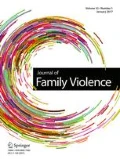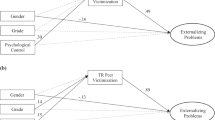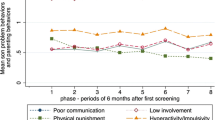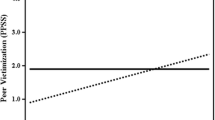Abstract
This study examined the transactional effects of parental physical and verbal aggression and children’s externalizing (EP) and internalizing problems (IP) from early school age to adolescence in lower-income community sample using a multi-informant perspective. Mother-child dyads (n = 175) from urban low socioeconomic backgrounds that are part of the Concordia Longitudinal Research Project, a prospective intergenerational study, participated. Children’s EP and IP were assessed by mothers and teachers at ages 6–8, 9–11, and 13–17-years-old (Child Behavior Checklist). Mothers also self-reported physical and verbal aggression toward their child (Conflict Tactics Scales Parent-Child). Results from cross-lagged analyses with mothers’ reports of EP and IP revealed a transactional process with EP and physical aggression, and a child-driven effect with IP and verbal aggression. EP at 6–8-years-old were associated with increased physical aggression at 9–11 years of age, that in turn were associated with increased EP in adolescence. IP at 6–8 years old were associated with increased verbal aggression at 9–11 years. Some effects were identified when using teachers’ reports of socioemotional difficulties, including a transactional process from verbal aggression at 6–8 years old, to increased EP at 9–11 years, to increased physical aggression at 13–17 years. Overall, parent-driven and child-driven effects were present, but results differed across informants and behaviour problem types. These results have important implications for research and intervention that are discussed in light of the developmental psychopathology and transactional models of development.


Similar content being viewed by others
References
Achenbach, T., & Rescorla, L. (2001). Manual for the ASEBA school-ages forms & profiles. Burlington: University of Vermont.
Albrecht, A. K., Galambos, N. L., & Jansson, S. M. (2007). Adolescents’ internalizing and aggressive behaviors and perceptions of parents’ psychological control: A panel study examining direction of effects. Journal of Youth and Adolescence, 36(5), 673–684. https://doi.org/10.1007/s10964-007-9191-5.
Barbot, B., Crossman, E., Hunter, S. R., Grigorenko, E. L., & Luthar, S. S. (2014). Reciprocal influences between maternal parenting and child adjustment in a high-risk population: A 5-year cross-lagged analysis of bidirectional effects. American Journal of Orthopsychiatry, 84(5), 567–580. https://doi.org/10.1037/ort0000012.
Baydar, N., & Akcinar, B. (2018). Reciprocal relations between the trajectories of mothers’ harsh discipline, responsiveness and aggression in early childhood. Journal of Abnormal Child Psychology, 46(1), 83–97. https://doi.org/10.1007/s10802-017-0280-y.
Schwartzman, A., Ledingham, J., & Serbin, L. (1985). Identification of children at risk for adult schizophrenia: A longitudinal study. International Journal of Applied Psychology, 34, 363–380. https://doi.org/10.1111/j.1464-0597.1985.tb01333.x
Serbin, L.A., Cooperman, J.M., Peters, P.L., Lehoux, P.M., Stack, D.M.,& Schwartzman, A.E. (1998). Intergenerational transfer of psychosocial risk in women with childhood histories of aggression, withdrawal, or aggression and withdrawal. Developmental Psychology, 34, 1246. https://doi.org/10.1037/0012-1649.34.6.1246
Institut de la statistique de Québec (2005). Données sociales du Québec – Édition 2005. Retrieved from http://www.stat.gouv.qc.ca/statistiques/conditions-vie-societe/donnees-sociales05.pdf#page=157
Serbin, L.A., Kingdon, D., Ruttle, P.L., & Stack, D.M. (2015). The impact of children's internalizing and externalizing problems on parenting: Transactional processes and reciprocal change over time. Development and Psychopathology, 27, 969-986. https://doi.org/10.1017/s0954579415000632
Stack, D. M., Serbin, L. A., Matte-Gagné, C., Kingdon, I. M., Doiron, K., & Schwartzman, A. E. (2017). Development under adverse circumstances as a risk for psychopathology: An intergenerational study of children from disadvantaged high-risk backgrounds. In L. M. Centifanti & D. Williams (Eds.), Handbook of Developmental Psychopathology: Wiley-Blackwell.
Burnette, M. L., Oshri, A., Lax, R., Richards, D., & Ragbeer, S. N. (2012). Pathways from harsh parenting to adolescent antisocial behavior: A multidomain test of gender moderation. Development and Psychopathology, 24(3), 857–870. https://doi.org/10.1017/S0954579412000417.
Cecil, C. A. M., Barker, E. D., Jaffee, S. R., & Viding, E. (2012). Association between maladaptive parenting and child self-control over time: Cross-lagged study using a monozygotic twin difference design. The British Journal of Psychiatry, 201(4), 291–297. https://doi.org/10.1192/bjp.bp.111.107581.
Cheah, C. S. L., & Rubin, K. H. (2004). European American and mainland Chinese mothers’ responses to aggression and social withdrawal in preschoolers. International Journal of Behavioral Development, 28(1), 83–94. https://doi.org/10.1080/01650250344000299.
Cicchetti, D. (2006). Development and psychopathology. In D. Cicchetti & D. J. Cohen (Eds.), Developmental psychopathology volume 1: Theory and method (2nd ed., Vol. 1, pp. 1–23). New Jersey: John Wiley & Sons.
Cicchetti, D., & Rogosch, F. A. (2002). A developmental psychopathology perspective on adolescence. Journal of Consulting and Clinical Psychology, 70(1), 6–20. https://doi.org/10.1037/0022-006X.70.1.6.
Colman, I., Wadsworth, M. E. J., Croudace, T. J., & Jones, P. B. (2007). Forty-year psychiatric outcomes following assessment for internalizing disorder in adolescence. The American Journal of Psychiatry, 164(1), 126–133. https://doi.org/10.1176/appi.ajp.164.1.126.
Cosgrove, V. E., Rhee, S. H., Gelhorn, H. L., Boeldt, D., Corley, R. C., Ehringer, M. A., Young, S. E., & Hewitt, J. K. (2011). Structure and etiology of co-occurring internalizing and externalizing disorders in adolescents. Journal of Abnormal Child Psychology, 39(1), 109–123. https://doi.org/10.1007/s10802-010-9444-8.
Davidov, M., Knafo-Noam, A., Serbin, L. A., & Moss, E. (2015). The influential child: How children affect their environment and influence their own risk and resilience. Development and Psychopathology, 27(4pt1), 947–951. https://doi.org/10.1017/S0954579415000619.
De Los Reyes, A. (2011). Introduction to the special section: More than measurement error: Discovering meaning behind informant discrepancies in clinical assessments of children and adolescents. Journal of Clinical Child & Adolescent Psychology, 40(1), 1–9. https://doi.org/10.1080/15374416.2011.533405.
DelCarmen-Wiggins, R., & Carter, A. (2004). Measurement issues: Introduction. In R. DelCarmen-Wiggins & A. Carter (Eds.), Handbook of infant, toddler, and preschool mental health assessment (pp. 183–184). New York: Oxford University Press.
Derella, O. J., Burke, J. D., Stepp, S. D., & Hipwell, A. E. (2019). Reciprocity in undesirable Parent-child behavior? Verbal aggression, corporal punishment, and Girls' oppositional defiant symptoms. Journal of Clinical Child & Adolescent Psychology, 49, 1–14. https://doi.org/10.1080/15374416.2019.1603109.
Dong, Y., & Peng, C.-Y. J. (2013). Principled missing data methods for researchers. SpringerPlus, 2(1), 222. https://doi.org/10.1186/2193-1801-2-222.
Durlak, J. A., Fuhrman, T., & Lampman, C. (1991). Effectiveness of cognitive-behavior therapy for maladapting children: A meta-analysis. Psychological Bulletin, 110(2), 204–214. https://doi.org/10.1037/0033-2909.110.2.204.
Eiraldi, R., Power, T. J., Schwartz, B. S., Keiffer, J. N., McCurdy, B. L., Mathen, M., & Jawad, A. F. (2016). Examining effectiveness of group cognitive-behavioral therapy for externalizing and internalizing disorders in urban schools. Behavior Modification, 40(4), 611–639. https://doi.org/10.1177/0145445516631093.
Eisenberg, N., Hofer, C., Sulik, M. J., & Spinrad, T. L. (2013). Self-regulation, effortful control, and their socioemotional correlates. In J. J. Gross (Ed.), Handbook of emotion regulation (Second ed., pp. 157–172). New York: The Guilford Press.
Erskine, H. E., Norman, R. E., Ferrari, A. J., Chan, G. C. K., Copeland, W. E., Whiteford, H. A., & Scott, J. G. (2016). Long-term outcomes of attention-deficit/hyperactivity disorder and conduct disorder: A systematic review and meta-analysis. Journal of the American Academy of Child & Adolescent Psychiatry, 55(10), 841–850. https://doi.org/10.1016/j.jaac.2016.06.016.
Feldstein, J., Stack, D. M., Serbin, L. A., Hastings, P. D., Mills, R. S. L., & Schwartzman, A. E. (2020). Dispositional, parental, and familial contributors to early emerging externalizing problems: A bioecological systems and integrative analysis approach. Manuscript in preparation.
Finkelhor, D., Ormrod, R., Turner, H., & Holt, M. (2009). Pathways to poly-victimization. Child Maltreatment, 14(4), 316–329. https://doi.org/10.1177/1077559509347012.
Finkelhor, D., Vanderminden, J., Turner, H., Hamby, S., & Shattuck, A. (2014). Child maltreatment rates assessed in a national household survey of caregivers and youth. Child Abuse & Neglect, 38(9), 1421–1435. https://doi.org/10.1016/j.chiabu.2014.05.005.
Fitzsimons, G. M., & Finkel, E. J. (2013). The effects of self-regulation on social relationships. In K. D. Vohs & R. F. Baumeister (Eds.), Handbook of self-regulation: Research, theory, and applications (Second ed., pp. 407–421). New York: Guilford Press.
Forgatch, M. S., & Patterson, G. R. (2010). Parent management training—Oregon model: An intervention for antisocial behavior in children and adolescents.
Ghafoori, B. (2001). Effectiveness of cognitive-behavioral therapy in reducing classroom disruptive behaviors: A meta-analysis (Doctoral Dissertation). Retrieved from http://0-search.ebscohost.com.mercury.concordia.ca/login.aspx?direct=true&db=psyh&AN=2001-95010-126&site=ehost-live&scope=site
Graber, J. A., & Brooks-Gunn, J. (1996). Transitions and turning points: Navigating the passage from childhood through adolescence. Developmental Psychology, 32(4), 768–776. https://doi.org/10.1037/0012-1649.32.4.768.
Hentges, R. F., Davies, P. T., & Cicchetti, D. (2015). Temperament and interparental conflict: The role of negative emotionality in predicting child behavioral problems. Child Development, 86(5), 1333–1350. https://doi.org/10.1111/cdev.12389.
Jobe-Shields, L., Buckholdt, K. E., Parra, G. R., & Tillery, R. N. (2014). Adolescent reactions to maternal responsiveness and internalizing symptomatology: A daily diary investigation. Personal Relationships, 21(2), 335–348.
Kenny, D. A. (2015, November 25). Measuring model fit. Retrieved from http://davidakenny.net/cm/fit.htm
Kim, J., & Cicchetti, D. (2010). Longitudinal pathways linking child maltreatment, emotion regulation, peer relations, and psychopathology. Journal of Child Psychology and Psychiatry, 51(6), 706–716. https://doi.org/10.1111/j.1469-7610.2009.02202.x.
Kim, K., Mennen, F. E., & Trickett, P. K. (2017). Patterns and correlates of co-occurrence among multiple types of child maltreatment. Child and Family Social Work, 22(1), 492–502. https://doi.org/10.1111/cfs.12268.
Kremer, K. P., Flower, A., Huang, J., & Vaughn, M. G. (2016). Behavior problems and children's academic achievement: A test of growth-curve models with gender and racial differences. Children and Youth Services Review, 67, 95–104. https://doi.org/10.1016/j.childyouth.2016.06.003.
Kuczynski, L., & De Mol, J. (2015). Dialectical models of socialization. Handbook of child psychology and developmental science. Hoboken: John Wiley & Sons, Inc..
Lansford, J. E., Criss, M. M., Laird, R. D., Shaw, D. S., Pettit, G. S., Bates, J. E., & Dodge, K. A. (2011). Reciprocal relations between parents' physical discipline and children's externalizing behavior during middle childhood and adolescence. Development and Psychopathology, 23(01), 225–238. https://doi.org/10.1017/S0954579410000751.
Laursen, B., Coy, K. C., & Collins, W. A. (1998). Reconsidering changes in parent-child conflict across adolescence: A meta-analysis. Child Development, 69(3), 817–832. https://doi.org/10.1111/j.1467-8624.1998.tb06245.x.
Lee Wiggins, J., Mitchell, C., Hyde, L. W., & Monk, C. S. (2015). Identifying early pathways of risk and resilience: The codevelopment of internalizing and externalizing symptoms and the role of harsh parenting. Development & Psychopathology, 27, 1295–1312. https://doi.org/10.1017/S0954579414001412.
Liang, H., & Eley, T. C. (2005). A monozygotic twin differences study of nonshared environmental influence on adolescent depressive symptoms. Child Development, 76(6), 1247–1260. https://doi.org/10.1111/j.1467-8624.2005.00848.x.
Little, T. D., Jorgensen, T. D., Lang, K. M., & Moore, E. W. (2014). On the joys of missing data. Journal of Pediatric Psychology, 39(2), 151–162. https://doi.org/10.1093/jpepsy/jst048.
Liu, J., Xiao, B., Coplan, R. J., Chen, X., & Li, D. (2018). Cross-lagged panel analyses of child shyness, maternal and paternal authoritarian parenting, and teacher-child relationships in mainland China. Journal of Child and Family Studies, 27, 4116–4125.
Lysenko, L. J., Barker, E. D., & Jaffee, S. R. (2013). Sex differences in the relationship between harsh discipline and conduct problems. Social Development, 22(1), 197–214. https://doi.org/10.1111/sode.12002.
Mackler, J. S., Kelleher, R. T., Shanahan, L., Calkins, S. D., Keane, S. P., & O’Brien, M. (2015). Parenting stress, parental reactions, and externalizing behavior from ages 4 to 10. Journal of Marriage and the Family, 77(2), 388–406. https://doi.org/10.1111/jomf.12163.
Marceau, K., Ram, N., & Susman, E. (2015). Development and lability in the parent-child relationship during adolescence: Associations with pubertal timing and tempo. Journal of Research on Adolescence, 25(3), 474–489. https://doi.org/10.1111/jora.12139.
Michelson, D., Davenport, C., Dretzke, J., Barlow, J., & Day, C. (2013). Do evidence-based interventions work when tested in the 'real world?' a systematic review and meta-analysis of parent management training for the treatment of child disruptive behavior. Clinical Child and Family Psychology Review, 16(1), 18–34. https://doi.org/10.1007/s10567-013-0128-0.
Mills, R. S. L., Hastings, P. D., Helm, J., Serbin, L. A., Etezadi, J., Stack, D. M., Schwartzman, A. E., & Li, H. H. (2012). Temperamental, parental, and contextual contributors to early-emerging internalizing problems: A new integrative analysis approach. Social Development, 21(2), 229–253. https://doi.org/10.1111/j.1467-9507.2011.00629.x.
Moffitt, T. E., Caspi, A., Harrington, H., & Milne, B. J. (2002). Males on the life-course-persistent and adolescence-limited antisocial pathways: Follow-up at age 26 years. Development and Psychopathology, 14(1), 179–207.
National Academies of Sciences, Engineering, and Medicine (2016). Parenting matters: Supporting parents of children ages 0–8. Washington, DC: The National Academies Press. doi: https://doi.org/10.17226/21868.
Olson, S. L., & Lunkenheimer, E. S. (2009). Expanding concepts of self-regulation to social relationships: Transactional processes in the development of early behavioral adjustment. In A. Sameroff (Ed.), The transactional model of development: How children and contexts shape each other (p. 55–76). American Psychological Association. https://doi.org/10.1037/11877-004.
Patterson, G. R., Dishion, T. J., & Bank, L. (1984). Family interaction: A process model of deviancy training. Aggressive Behavior, 10(3), 253–267.
Pekarik, E. G., Prinz, R. J., Liebert, D. E., Weintraub, S., & Neale, J. M. (1976). The pupil evaluation inventory: A sociometric technique for assessing children’s social behavior. Journal of Abnormal Child Psychology, 4(1), 83–97.
Reef, J., Diamantopoulou, S., van Meurs, I., Verhulst, F. C., & van der Ende, J. (2011). Developmental trajectories of child to adolescent externalizing behavior and adult DSM-IV disorder: Results of a 24-year longitudinal study. Social Psychiatry and Psychiatric Epidemiology, 46(12), 1233–1241. https://doi.org/10.1007/s00127-010-0297-9.
Reuben, J. D., Shaw, D. S., Neiderhiser, J. M., Natsuaki, M. N., Reiss, D., & Leve, L. D. (2016). Warm parenting and effortful control in toddlerhood: Independent and interactive predictors of school-age externalizing behavior. Journal of Abnormal Child Psychology, 44(6), 1083–1096. https://doi.org/10.1007/s10802-015-0096-6.
Rioux, C., Castellanos-Ryan, N., Parent, S., & Séguin, J. R. (2016). The interaction between temperament and the family environment in adolescent substance use and externalizing behaviors: Support for diathesis–stress or differential susceptibility? Developmental Review, 40, 117–150. https://doi.org/10.1016/j.dr.2016.03.003.
Rosen, A. L., Handley, E. D., Cicchetti, D., & Rogosch, F. A. (2018). The impact of patterns of trauma exposure among low income children with and without histories of child maltreatment. Child Abuse & Neglect, 80, 301–311. https://doi.org/10.1016/j.chiabu.2018.04.005.
Rossi, P. H., Sampson, W. A., Bose, C. E., Jasso, G., & Passel, J. (1974). Measuring household social standing. Social Science Research, 3, 169–190.
Sameroff, A. (2009). The transactional model of development: How children and contexts shape each other. (A. Sameroff Ed.). Washington, DC: American Psychological Association.
Scaramella, L. V., Neppl, T. K., Ontai, L. L., & Conger, R. D. (2008). Consequences of socioeconomic disadvantage across three generations: Parenting behavior and child externalizing problems. Journal of Family Psychology, 22(5), 725–733. https://doi.org/10.1037/a0013190.
Sng, K. I., Hawes, D. J., Raine, A., Ang, R. P., Ooi, Y. P., & Fung, D. S. S. (2018). Callous unemotional traits and the relationship between aggressive parenting practices and conduct problems in Singaporean families. Child Abuse & Neglect, 81, 225–234. https://doi.org/10.1016/j.chiabu.2018.04.026.
Straus, M. A. (1979). Measuring intrafamily conflict and violence: The conflict tactics (CT) scales. Journal of Marriage and the Family, 41(1), 75–88. https://doi.org/10.2307/351733.
Thijssen, J., Vink, G., Muris, P., & de Ruiter, C. (2017). The effectiveness of Parent management training—Oregon model in clinically referred children with externalizing behavior problems in the Netherlands. Child Psychiatry and Human Development, 48(1), 136–150. https://doi.org/10.1007/s10578-016-0660-5.
Thompson, R. A. (2013). Socialization of emotion and emotion regulation in the family. In J. J. Gross (Ed.), Handbook of emotion regulation (Second ed., pp. 173–186). New York: The Guilford Press.
Vaillancourt, T., Brittain, H. L., McDougall, P., & Duku, E. (2013). Longitudinal links between childhood peer victimization, internalizing and externalizing problems, and academic functioning: Developmental cascades. Journal of Abnormal Child Psychology, 41(8), 1203–1215. https://doi.org/10.1007/s10802-013-9781-5.
Waldman, I. D., Poore, H. E., van Hulle, C., Rathouz, P. J., & Lahey, B. B. (2016). External validity of a hierarchical dimensional model of child and adolescent psychopathology: Tests using confirmatory factor analyses and multivariate behavior genetic analyses. Journal of Abnormal Psychology, 125(8), 1053–1066. https://doi.org/10.1037/abn0000183.
Wang, M.-T., & Kenny, S. (2014). Parental physical punishment and adolescent adjustment: Bidirectionality and the moderation effects of child ethnicity and parental warmth. Journal of Abnormal Child Psychology, 42, 717–730.
Whalen, D. J., Luby, J. L., Tilman, R., Mike, A., Barch, D., & Belden, A. C. (2016). Latent class profiles of depressive symptoms from early to middle childhood: Predictors, outcomes, and gender effects. Journal of Child Psychology and Psychiatry, 57(7), 794–804. https://doi.org/10.1111/jcpp.12518.
Williams, S. R., Kertz, S. J., Schrock, M. D., & Woodruff-Borden, J. (2012). A sequential analysis of parent–child interactions in anxious and nonanxious families. Journal of Clinical Child & Adolescent Psychology, 41(1), 64–74.
Xing, X., Wang, M., Zhang, Q., He, X., & Zhang, W. (2011). Gender differences in the reciprocal relationships between parental physical aggression and children's externalizing problem behavior in China. Journal of Family Psychology, 25(5), 699–708. https://doi.org/10.1037/a0025015.
Acknowledgments
This research was partially supported by grants from Child & Youth Mental Health and Well-being (Health Canada), Fonds québécois de la recherche sur la société et la culture (FRQ-SC), and the Social Sciences and Humanities Research Council of Canada (SSHRC). The first author was supported by fellowships from the FRQ-SC and Concordia University. The Concordia Project originated in 1976 under the direction of Jane Ledingham and Alex E. Schwartzman. The intergenerational project is currently directed by Lisa A. Serbin and Dale M. Stack. We extend our gratitude to Joelle Belisle-Cuillerier and Catherine Delisle for help with the preparation of this manuscript. We also wish to thank Claude Senneville and the Concordia Project team for their assistance in data collection and analysis. Finally, we are most indebted to the participants in the study.
Author information
Authors and Affiliations
Corresponding authors
Ethics declarations
Conflict of Interest
The authors declare that they have no conflict of interest.
Additional information
Publisher’s Note
Springer Nature remains neutral with regard to jurisdictional claims in published maps and institutional affiliations.
Rights and permissions
About this article
Cite this article
Langevin, R., Stack, D.M., Dickson, D.J. et al. Transactional Associations between Children’s Socioemotional Difficulties and Parental Aggression toward the Child over a Ten-Year Period in a Lower-Income Population. J Fam Viol 36, 1017–1031 (2021). https://doi.org/10.1007/s10896-020-00209-6
Accepted:
Published:
Issue Date:
DOI: https://doi.org/10.1007/s10896-020-00209-6




